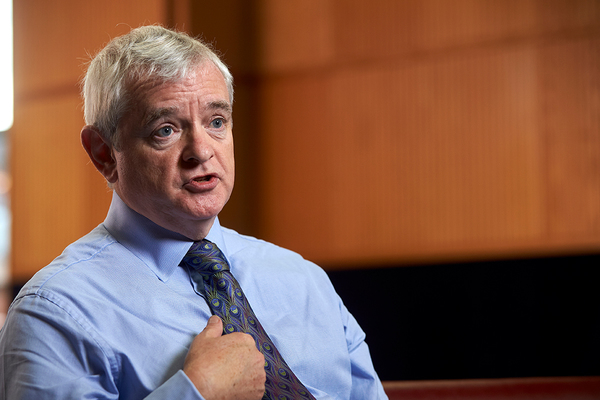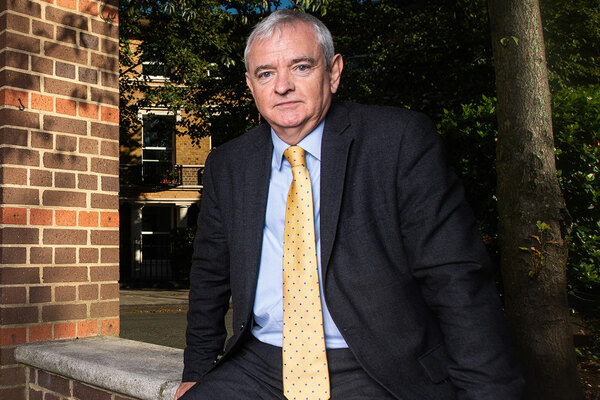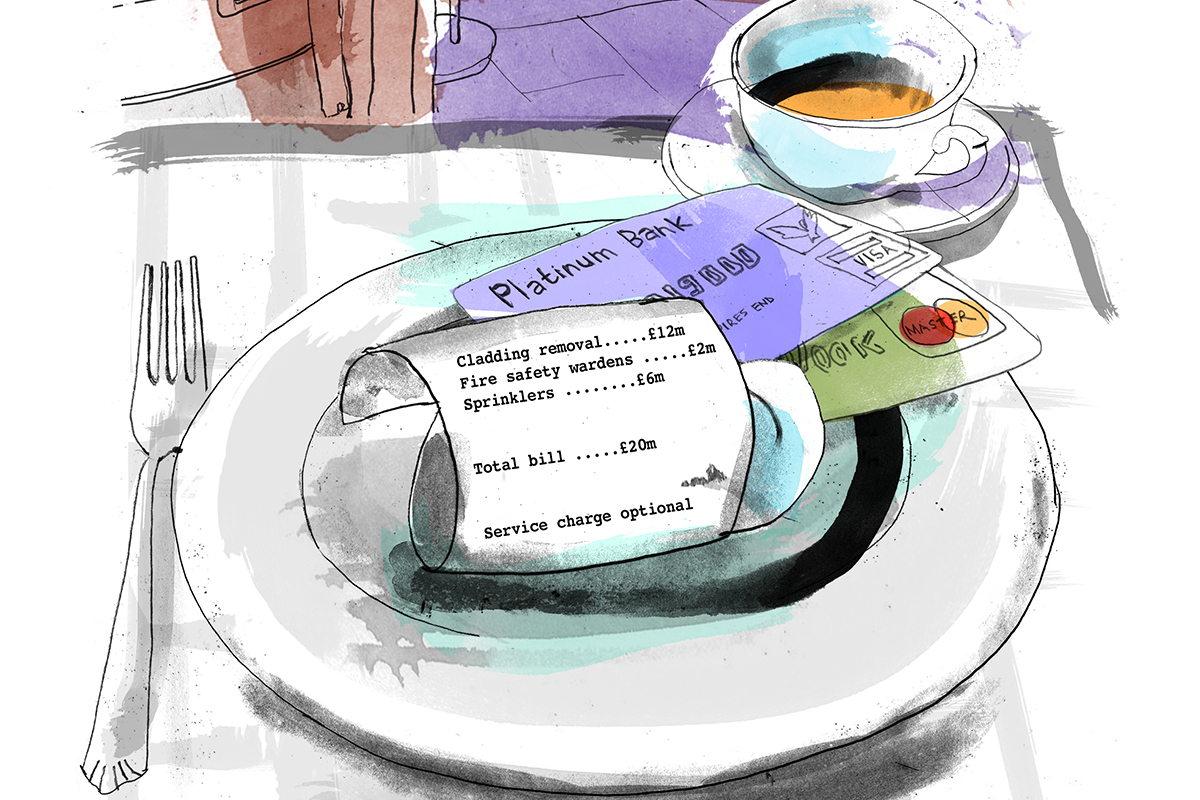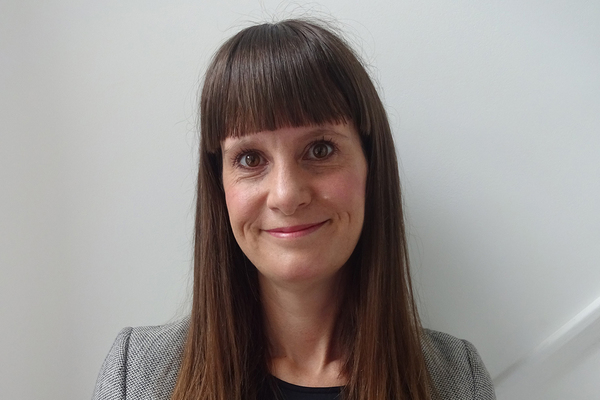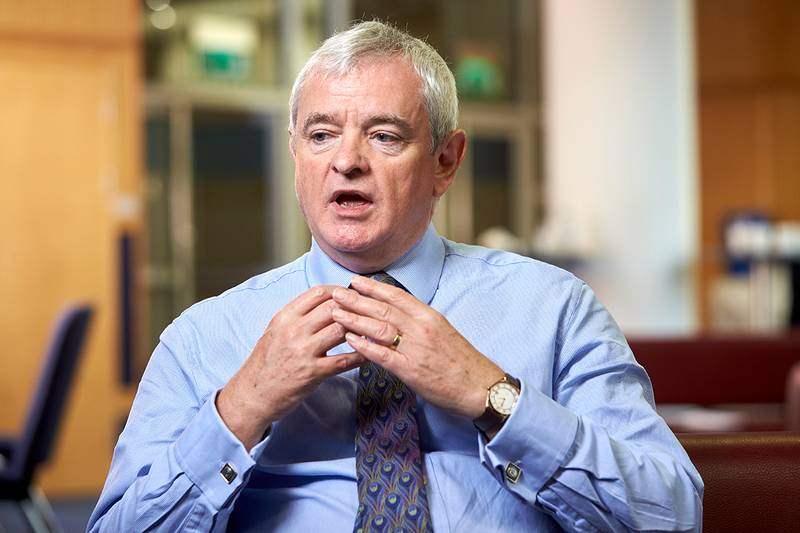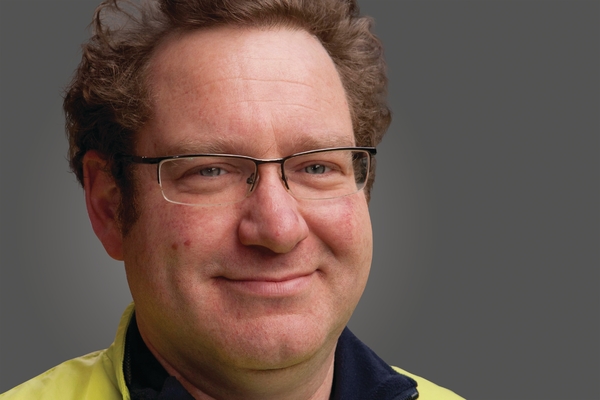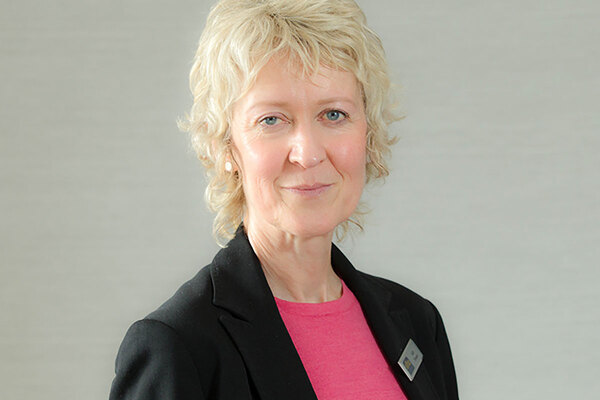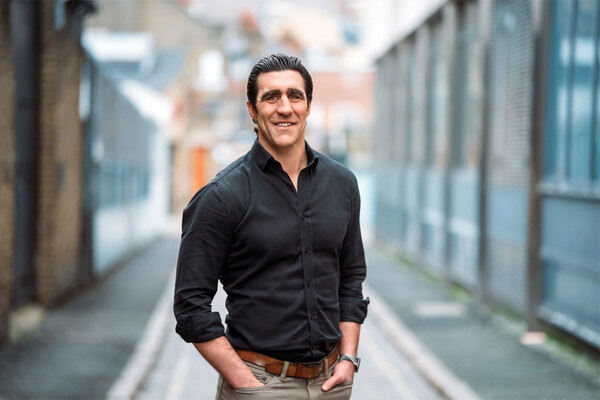Interview with David Orr: ‘We have an obligation to make this a moment of change’
As David Orr announces his retirement, we republish Pete Apps’ interview with the National Housing Federation chief executive from last September. Photography by Ed Moss
This article was originally published on 28 September 2017
When Inside Housing arrives five minutes early for our interview with David Orr it is no surprise to find him deep in conversation with a politician.
The National Housing Federation (NHF) chief executive is standing behind a sofa in the green room at his organisation’s annual conference.
He is engaged in a muttered conversation with Labour’s John Healey – who Mr Orr has both collaborated with and clashed with over the span of his 12-year stint at the helm of the NHF. Both lower their voices when they notice a journalist lurking nearby.
Mr Orr is an in-demand man at this conference – a busy two-day burst in Birmingham’s International Convention Centre – but he has found half an hour in his packed diary to sit down for an interview with Inside Housing.
A mere 26 months have passed since we last ran a feature-length interview with Mr Orr, but it feels like much longer. That interview came in the week George Osborne announced the 1% rent cut with some harsh words about the housing association sector’s efficiency.
Times are changing
Then Mr Orr described the sector’s relationship with government as “stretched”. “This definitely looks like a difficult week,” he said at the time. “But there will be weeks after it that will be not so difficult.”
Indeed there have.
Since then the political climate has shifted – the sector has faced and absorbed a rent cut, struck what some deemed a Faustian pact over the Right to Buy extension, befriended a new government post-Brexit and been shaken to its core by the Grenfell disaster. Mr Orr has been at the heart of all this, and has been forced to manoeuvre, battle and compromise like never before.
But this lobbying effort appears to have worked. We meet a day after Sajid Javid, communities secretary, took to the stage to declare that social housing must be “treasured”, praise the work of housing associations generally and drop a heavy hint that the forthcoming rent deal will return to annual inflation-linked rises.
All of these are things that would have seemed improbable two years ago. Then, associations were in the cross hairs of government and facing a series of brutal attacks in the media.
Mr Orr remains in no doubt over where these attacks were coming from. “Even at the time, it was clear there was a co-ordinated view from the Number 10 policy unit that they had to have a go at housing associations,” he says.
Mr Orr describes this media hostility, which resulted in simultaneous pieces in The Spectator, The Times and on Channel 4 News, as a “two fingers straight in the eyeballs attack”.
“It’s interesting in the space of five minutes having someone say to you face to face ‘you’re a genius, how the hell did you manage to do that?’ and someone else saying ‘you completely sold out, you bastard’,”
“I think everyone in the sector including me felt a bit like ‘wow, where did that come from?’,” Mr Orr recalls. “Politically, we had assumed no one loves us completely but everyone thinks we’re OK. It was a co-ordinated attack which pushed people back on their heels and led us in the NHF to do some rapid thinking about how easy it was for us to discover that when push came to shove we didn’t have any big political allies.”
The attack, he says, was driven by “some people who had been in [thinktank] Policy Exchange, one person in particular” – a reference to David Cameron’s then-housing policy advisor Alex Morton. The aim, Mr Orr says, was to direct public opinion against the sector to soften it up ahead of cuts, or worse.“
There were some people around government who were saying… nationalise [associations] so we can privatise them, which would have led to asset stripping,” Mr Orr says.It was into this context that the most controversial moment of Mr Orr’s recent career arrived. Just months after publicly attacking the Right to Buy policy and plans to extend it to housing associations, Mr Orr led the sector into an about face. In a moment of extraordinary political theatre at the conference two years ago, he called on his members to vote on adopting the policy voluntarily.
Mr Orr won his vote – 55% of members said yes, 6% said no and 39% abstained, with associations controlling 93% of the sector’s stock signing up. But it also opened up Mr Orr to ferocious and bitter criticism from those angry about the fire sale of social housing and what the deal would entail.
“It’s interesting in the space of five minutes having someone say to you face to face ‘you’re a genius, how the hell did you manage to do that?’ and someone else saying ‘you completely sold out, you bastard’,” he recalls.
Regardless of where you stand on the deal, it is impossible to deny that it changed the position of housing associations within government.“I think it was a very, very important moment. What we demonstrated as a sector is that we were sensible, rational, grown-up people with whom it was possible to negotiate and indeed to do deals,” says Mr Orr.
Voluntary deal
Indeed, just weeks later when housing associations were reclassified as part of the public sector, there was no talk of nationalisation. Instead, the government moved to deregulate and reverse the decision, saying associations are “voluntary organisations and we… strongly believe they should continue to be independent of government”.
The voluntary deal was also an important moment for Mr Orr. Amid some savage criticism he was touched by how willing some members were to place their trust in him.
“There were a lot of people who said we’re not comfortable with this but you’re asking us to do it so we will do it and that was affirming,” he says.
This speaks to the esteem with which Mr Orr is held among his members. At the NHF conferences he has a status approaching celebrity and his closing addresses have been compared, by more than one sector figure, to a Pentecostal preacher addressing a crowd of the faithful.
This year was no exception – delivered as usual without notes, Mr Orr roamed the main stage, sleeves rolled up, jacket off, extolling delegates for nearly half an hour about the importance of their “mission”.
Mr Orr certainly knows how to perform. He is, sources say, a good singer and a fan of numbers from musicals at NHF karaoke nights.
In person he is a man with much to say – possessing an ability to throw his thoughts together into passionate and quotable sound bites, rarely pausing for more than a beat after each question.
"Grenfell was your worst nightmare appearing before your eyes"
All this points towards a genuine passion for his sector and what it stands for. Mr Orr, who worked for a homelessness charity and housing associations before moving to lead the Scottish Federation of Housing Associations and finally the NHF, lives and breathes his cause. But he remains guided by political timing, too.
At this year’s conference, he publicly attacked the government’s failure to fund new social rented housing for the first time in several years. Mr Orr says this has been a point of pragmatism, not philosophy.
“Every single day in this job, what you are doing is gauging what the message is, what the right time is for that message and when it is likely to have traction. If we had misjudged the moment we might have killed the argument completely. So all the time, it is a judgement call,” he says.
Just about managing
An example of this judgement being used soundly was the aftermath of Brexit, when the NHF sensed the change of tone from government as it moved from David Cameron to Theresa May’s rhetoric of “just about managing” families. It was able, as a result, to successfully call for grant funding to be shifted towards rent, undoing the previous insistence that the government should only fund homeownership and convincing the chancellor to swell the funds available for affordable homes by £1.4bn in the Autumn Statement.
“That was a moment of crisis for government,” says Mr Orr. “What we were able to say, not because of Brexit but because of the context it created, is if you want to be seen to be doing something that is genuinely focusing on those people [just about managing] there is nothing better than housing.”
The latest call for funding for social rented housing comes at another moment of crisis in the aftermath of the Grenfell disaster. Does he see the tragedy as a new era for the sector?
“Either it is or we have to make it so,” he says. “Because it was so horrible. It’s a long time since I ran a housing association but Grenfell was your worst nightmare appearing before your eyes. Could it have happened in the private sector? I think it probably could. But it happened in our sector, it created a focus and I think that we do have an obligation as a result to make this a moment of change.”
As the sector faces up, then, to this latest turning point there are many who will be reassured to know it remains Mr Orr bending the ear of politicians on their behalf.
IH Meets
IH meets is a series of profile interviews, where we meet a different figure within or connected to the housing sector.
Interviews:
August 2018: Gary Porter
June 2018: Peter Denton
March 2018: Rebecca Evans
March 2018: Nick Walkley
March 2018: Sinead Butters
February 2018: Nicholas Coombe
January 2018: Eddie Hughes
November 2017: Melanie Onn
October 2017: Maxine Holdsworth
September 2017: David Orr


